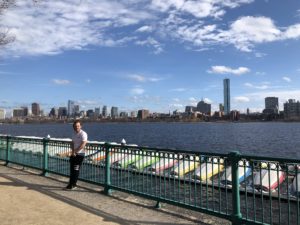
I grew up with a lot of interests as a kid. I wanted to know a little bit about everything. I would immerse myself in certain activities or subjects that intrigued me until I gained enough knowledge to be competent. Once I was comfortable with what I learned I would just move on to the next thing that caught my interest. An NFL football player, song-writer, DJ, actor, physical therapist, and professional body-builder were just some of the things I wanted to do at certain times of my life.
I went to college part-time while working full-time, getting all of my general credits while I tried to decide what to do with my life. One thing that had always been an interest of mine was music. I had always been a good writer, and had been writing songs since I was twelve years old. Since I didn’t need a degree to be a song-writer, I decided the next best thing was to major in music production.
Deep down inside I knew I didn’t really want to make music a career for me. It was simply one of the many things I liked to do with my free time. Once I did a mental cost-benefit analysis on what it would take to live comfortably in that career, and how difficult it would be to actually make it a career that wouldn’t result in me wandering if I can make my next rent payment before I catch my big break, I realized my ‘passion’ didn’t outweigh the practicality of choosing a more lucrative way to make a living.
“Do what you’re passionate about and the money will follow”
I’m sure everyone has been told this at some point. You know, that charismatic slogan that meant somewhere out there in the world there’s a plethora of people just waiting to give you their money solely on the basis of your level of passion. Although I’m sure the individuals that gave you that advice had the best intentions, it should be said with a disclaimer attached. Having passions are important, but that doesn’t always make you economically valuable.
The failure to emphasize this caveat has aided in a generation of young people accruing substantial amounts of student loan debt and little practical skills to be desired in the job market. College graduates are feeling like they’ve been duped. They have been promised jobs that are either not available or don’t pay well enough for them to live comfortably on their own. On top of of all that they are now saddled with debt totaling over $1.2 trillion country-wide. As a result of these useless degrees they are putting off buying houses, getting married, and starting families, further crippling the nation’s already overextended economy.
These unfortunate facts had me feeling like I was wasting time and money. I finally decided to reevaluate what it was I was good at and looked to see if I could find well-paying jobs in high demand that matched my skillset. After months of narrowing my job list down I decided to take a shot at web development. At the time I knew nothing about computers and was (and still am) terrible at math. I knew, however, that I had good problem solving skills and loved to build things. This was also a field that did not require a degree and had a low barrier-of-entry. Web development had never been my passion, but something that I thought I could leverage my skills with and make a decent living.
After almost a year of intense studying I was able to land my first developer job. After two years working in the field I started to really love and take pride in what I do. I now have zero student loan debt and make a salary that allows me to engage in all my current passions–including traveling the world.
Although my career is something I love, it didn’t start out that way. I didn’t go into it with the expectation that I was even going to eventually love it. I just knew what I wanted, what I was good at, and what I was willing to do in order to live the lifestyle I was striving for. My job was a means to an end. It was just a bonus that I ended up loving it.
Am I suggesting people abandon their passions and commit themselves to an unfulfilled life by taking the safe route in a well paying career you hate? Not at all. I want to encourage people to think about the possibility that their passion and how they make a living might not always be the same thing. It’s okay to separate these things for your own well-being, as well as the well-being of the overall economy.
Not all passions are profitable. If your goal isn’t to be profitable, but to be passionate, by all means, do what makes you happy. At the same time you still need to be able to support yourself. I think it’s important to understand this so we don’t foster a culture that seeks to blame others and demands financial restitution from those who decided to choose a better career path all because they simply were not given the whole story in the first place. I want to encourage you to ask yourself about the practicality of your passions. It’s great to have hobbies and interests; it’s part of what makes the stressing worth it. But you also need to put food on the table.





